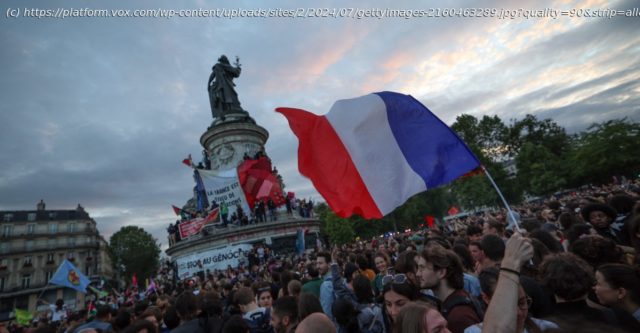The European elections tell us little about Biden’s chances — but a lot about his choices.
This past week saw elections in two of the world’s biggest democracies, the United Kingdom and France. The results of Britain’s July 4 election were (mostly) as expected: a romp for center-left Labour, dethroning the Conservative party after 14 years in power.
But Sunday’s French results came as a surprise. The far-right National Rally (RN), widely predicted to triumph, came in third place. The New Popular Front (NFP), a left alliance ranging from the center-left socialists to the radical France Unbowed, took a plurality of seats — a stunning victory made possible by tactical coordination with President Emmanuel Macron’s centrist Renaissance.
Almost immediately after the French results came in, the takes began flying. The results proved that the center was surging against the far-right. Or perhaps that the left is on the march. Or perhaps, in one especially deluded analysis, that the results were proof of the far-right’s long-run rise.
The truth is that none of these analyses really hold up. There isn’t an obvious ideological throughline here, a grand story to tell about What This All Means for the world in 2024 — or what it might say about the mindset of American voters in November. Trying to tell the story of these elections as some unified left-versus-right struggle ends up misleading more than it helps.
But if you look at it through the lens of institutions — the ways that electoral systems and choices by party leaders shape outcomes — some key lessons start to pop out. In particular, the winning parties in both the UK and France won by realizing that the nature of their systems required that they sacrifice some specific candidates in order to defeat the right.
And that’s where there might be a lesson for America — and for the Democratic party in particular.
There is no doubt that right-wing factions lost in both Britain and France. But though both countries arrived at somewhat similar results, the actual story they tell is more complicated.
Labour’s victory over the Tories in Britain was not really an endorsement of its political agenda. While the party took about two-thirds of the seats in parliament, it managed to do so by winning a large number of constituencies by relatively narrow margins (with third party help). Robert Ford, a political scientist at the University of Manchester, noted that “more than half of their seats [were] won with a majority of 20 percent or less.”
Nationally, Labour only won 34 percent of the national popular vote — the lowest tally for a winning party in British history. Opinion polling on the eve of the election showed Labour leader Keir Starmer underwater with British voters.
More than anything else, the British election reflected simple frustration with 14 years of Conservative rule.






